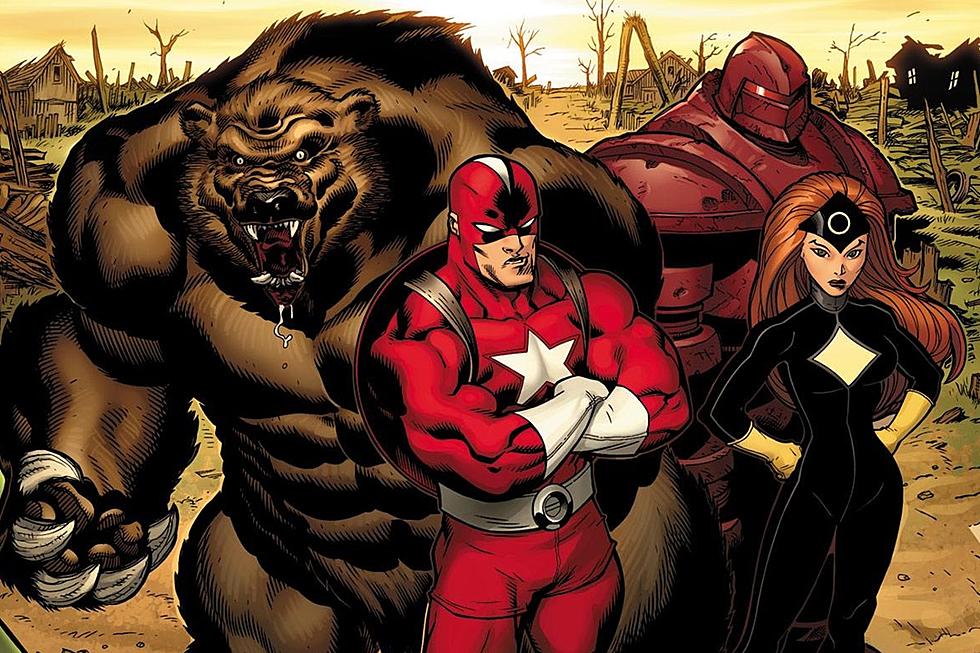
James Sturm Boycotts ‘The Avengers’ Film over Marvel’s Treatment of Jack Kirby

You can probably expect some very crowded theaters on the weekend of May 4, when The Avengers movie opens. One person you won't find among the crowds, however, is cartoonist James Sturm, an old-school Marvel fan who grew up to be a well-respected, critically acclaimed and highly influential comics creator of graphic novels like Market Day, Satchel Paige and The Golem's Mighty Swing, and the co-founder of the Center for Cartoon Studies. Despite his genuine excitement about the film, Sturm says he will be boycotting it over Disney and Marvel's treatment of Jack Kirby and his heirs, as he explained in a long opinion piece for Slate magazine headlined "Marvel Comics' Troubling Origin Story."In the course of the article, Sturm offers a fairly succinct capsule history of the creation of Marvel Comics, from the creative relationship of Jack Kirby and Stan Lee that kept Timely/Atlas from folding and reinvented superheroes with The Fantastic Four, to the advent of the Marvel Method, to Kirby's long and contentious relationship with the publisher, to Disney's 2009 $4 billion purchase of Marvel... and the Kirby heirs' subsequent lawsuit.
That was shut down last summer, when a federal judge sided with Disney/Marvel over the heirs. "I'm no legal scholar, so second-guessing federal judge Colleen McMahon is beyond me," Sturm writes. "But I know that Jack Kirby got a raw deal." He goes on:
"McMahon herself noted the distinction between ethics and law in her decision, 'This case is not about whether Kirby (and other freelance artists who created culturally iconic comic book characters for Marvel and other publishers) were treated 'fairly' by companies that grew rich off the fruits of their labor. It is about whether Kirby's work qualifies as work-for-hire...'"
She ruled that it did, and while that might serve to settle legal issues in a court of law, that's quite a separate thing from the ethical issues, and how various comics industry players-from publishers to creators to Avengers comics readers and movie-viewers-intend to address them.
Sturm again:
"What makes this situation especially hard to stomach is that Marvel's media empire was built on the backs of characters whose defining trait as superheroes is the willingness to fight for what is right. It takes a lot of corporate moxie to put Thor and Captain America on the big screen and have them battle for honor and justice when behind the scenes the parent company acts like a cold-blooded supervillain. As Stan Lee famously wrote, "With great power comes great responsibility."
Sturm is pretty realistic about the chances for a boycott of any kind convincing Disney and Marvel to settle up with Kirby's heirs (or the heirs of other creators), not because they have to legally, but because it's the right thing to do. Nonetheless, he adds, "if Mitt Romney is right, and corporations are people, perhaps Marvel/Disney has the capacity to feel shame."

He also notes cartoonist, author and industry activist Stephen Bissette's call for a Marvel boycott following last summer's ruling, and the impassioned response from comics journalist Tom Spurgeon, who previously addressed this issue in a 2004 interview with Sturm. Here's a piece from Spurgeon's August 2011 essay:
"[W]e live in a world where lottery winners will sometimes give money to the people that did nothing other than print their tickets, where fans will give money to someone if they express a need and do so based on the fact they benefited not to the tune of billions of dollars and enduring wealth for generations of their families but based on a satisfying artistic experience or series of them, where people routinely share their good fortune with others without a court telling them to do so-and allwithout trafficking in some heroic ideal as their stock in trade. None of this makes sense. It needs to matter more than it does."
Sturm also quotes cartoonist Seth at some length, including his comment that "what the Marvel corporation is doing might be legal but it certainly isn't right." I won't quote Sturm's killer conclusion here, for fear of spoiling it, but it's sharp, pointy and poised to draw blood.
Sturm didn't always feel this strongly about Marvel's exploitation of Kirby's creations and their treatment of Kirby, his legacy and his heirs, which he openly acknowledges in the piece. In 2003, Sturm wrote and provided artwork for a four-issue miniseres entitled Fantastic Four: Unstable Molecules. "At the time I had little reservation about working for Marvel," Sturm says simply. "Since then, things have changed."
I suppose seeing $4 billion dollars change hands and then, a few years later, millions of people downloading a trailer for a $300 million movie based on Kirby creations and co-creations has a way of underscoring just how valuable "The House That Jack Built" is, and how insane it seems that Disney/Marvel would rather fight with the children of those characters' creations in court than voluntarily share any of it.
In writing on the subject again today, Spurgeon also quoted Stan Lee's most famous fortune cookie of a line, the one he put in Uncle Ben's mouth: "With great power comes great responsibility, and I'm not sure how you define great power in our culture better than four billion dollars."
[Via Slate]
More From ComicsAlliance









